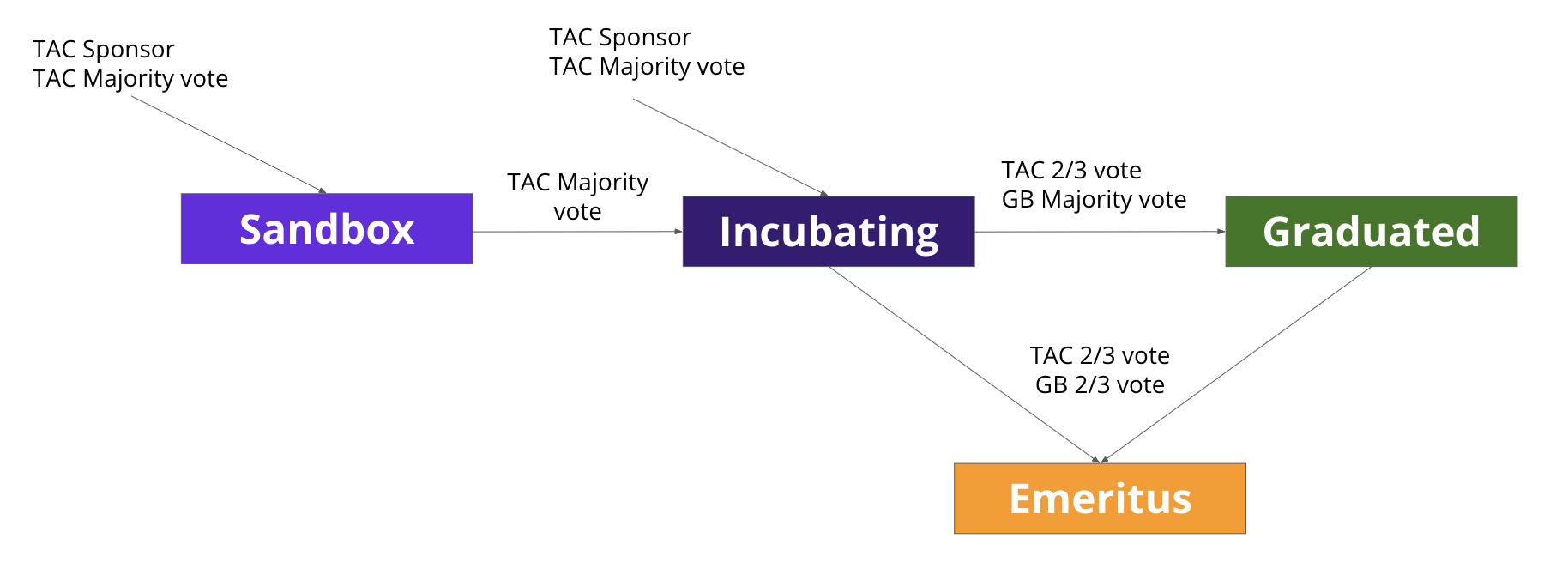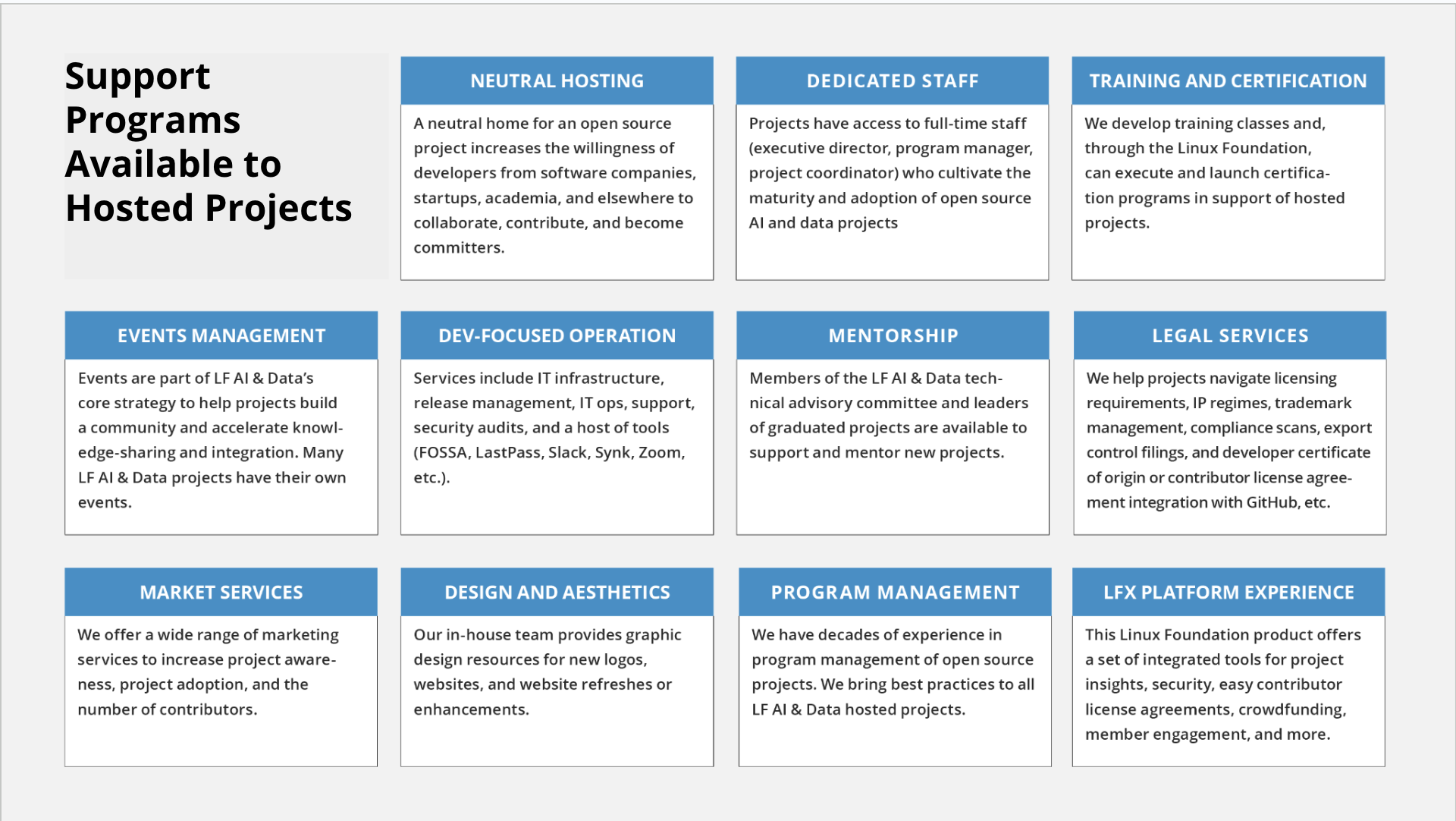The LF AI & Data Foundation is a prominent open-source software community contributor. It serves as a hub where AI, machine learning, and data experts can collaborate and create open-source tools and technologies. The foundation’s mission is to build and support an open AI community and drive open source innovation in the AI, ML, DL, and Data domains by enabling collaboration, sharing best practices, supporting development efforts, and creating new opportunities for all the community members. It provides a neutral environment that fosters open governance and encourages collaboration, resulting in projects that generate new opportunities for all community members.
Three distinct project lifecycles exist for progress within the LF AI & Data Foundation. These lifecycles help track the projects’ progress and success, ensuring they receive appropriate resources and support to thrive. Let’s explore these lifecycles and the benefits of establishing tiers for open-source projects.
 A project can proceed to the next stage if it fulfills the following criteria: meeting the requirements of the next project stage and obtaining affirmative votes from both the Technical Advisory Council (TAC) and the Governing Board (GB) for incubation and graduated projects.
A project can proceed to the next stage if it fulfills the following criteria: meeting the requirements of the next project stage and obtaining affirmative votes from both the Technical Advisory Council (TAC) and the Governing Board (GB) for incubation and graduated projects.
Understanding the Three Project Lifecycles
Sandbox Stage:
The Sandbox stage is the starting point for most projects entering the LF AI & Data Foundation. Projects at this stage are typically in their early stages and require validation, mentorship, and guidance to develop a sustainable community and governance model. During incubation, projects can access the foundation’s resources, including legal support, marketing assistance, events enablement, and IT basic services. This stage allows projects to receive the necessary support and visibility to grow.
Benefits:
- Guidance and mentorship: Sandbox projects benefit from the expertise and guidance of experienced community members.
- Resource allocation: The foundation provides resources to support projects during their initial development phase.
- Community building: Projects can leverage the foundation’s network to establish a community around their ideas and attract contributors.
Incubation Stage:
Once a project has demonstrated sustainability, growth, and maturity, it can progress to the incubation stage. Graduated projects have established strong governance and a self-sustaining community. They showcase the ability to deliver value to users and effectively manage their resources. Projects become more independent at this stage but still have access to the foundation’s support when needed.
Benefits:
- Autonomy: Incubation projects have more independence in their decision-making and operations.
- Continued support: projects can still rely on the foundation for support and collaboration opportunities.
- Recognition and visibility: Incubation projects gain recognition within the community, increasing their visibility and attracting potential users and contributors.
Graduation Stage:
The Graduation Stage project stage represents the highest level of maturity and success within the LF AI & Data Foundation. Projects at this stage are well-established, have a robust governance model, and provide substantial value to the community. They are crucial in the foundation’s ecosystem and often serve as flagship projects. Graduation projects continue to receive support from the foundation but operate with a higher degree of autonomy.
Benefits:
- Leadership role: Graduated projects become leaders in their respective domains and influence the direction of the foundation.
- Ecosystem impact: These projects contribute significantly to the LF AI & Data Foundation’s ecosystem, fostering innovation and collaboration.
- Long-term sustainability: The foundation ensures that top-level projects receive the necessary resources and support to maintain their success.
Establishing tiers or lifecycles for open-source projects brings several benefits to the projects and the community. It allows for efficient benchmarking and resource allocation, ensuring that each project receives appropriate support based on its stage of development. Additionally, it provides clear guidelines for projects to progress and mature, facilitating a sustainable open-source ecosystem. The tiered approach also helps users and contributors identify projects at different stages, making it easier to find the right fit for their needs and expertise.
Overall, the project life cycles within the LF AI & Data Foundation provide a structured framework that promotes the growth and success of open-source projects. By offering support, mentorship, and resources tailored to each project’s stage, the foundation fosters collaboration and drives innovation within the AI and data community.

To host a project under LF AI & Data, the Technical Advisory Council has developed a standardized application process:
- Decide on a date to present to the project to the TAC and propose incubation
- Ensure that your project implements these recommendations
- Submit a formal request to incubate the project via a GH PR
- Prepare the deck and share it with the LF AI & Data team 5 business days before the presentation to allow time for review and updates
- Present to the TAC and receive a positive vote to host the project in the foundation
- Onboard the project with the LF AI & Data team and integrate the project with the available support programs
- Announce the project becoming hosted in LF AI & Data
To learn more, please visit https://lfaidata.foundation/all-projects/hosting/.
The Role of the Technical Advisory Council (TAC)
The Technical Advisory Council (TAC) plays a critical role within the LF AI & Data Foundation. It is responsible for maintaining the technical vision and direction of the organization. The TAC facilitates collaboration among the technical projects hosted by the foundation, ensuring that their needs and requirements are effectively communicated to the Governing Board.
Here are the key responsibilities and functions of the TAC:
- Technical Vision and Direction
The TAC is responsible for defining and maintaining the technical vision and strategy of the LF AI & Data Foundation. It ensures that the technical projects align with the overall goals and objectives of the foundation.
- Collaboration and Communication
The TAC promotes collaboration and effective communication among the technical projects hosted by the foundation. It serves as a forum where project leaders and contributors can share knowledge, discuss challenges, and work together to address common technical issues.
- Integration Process
The TAC oversees the incubation process for new projects that join the foundation. It reviews project proposals and assesses their suitability for incubation within the LF AI & Data ecosystem. The TAC provides guidance, mentorship, and support to incubating projects to help them establish a sustainable community and governance model.
- Project Progress and Reviews
The TAC conducts annual reviews of existing projects hosted by the foundation. It evaluates the progress, maturity, and sustainability of these projects. Based on the review outcomes, the TAC may recommend projects for graduation to the next stage or propose necessary adjustments, such as archiving or removal, if a project is no longer active or aligned with the foundation’s goals.
- Conceptual Architecture
The TAC contributes to the creation of a conceptual architecture for the projects hosted by the LF AI & Data Foundation. This involves defining common technical frameworks, principles, and best practices to ensure consistency and interoperability across projects.
By fulfilling these responsibilities, the TAC plays a crucial role in nurturing the creation of innovative and high-quality open-source projects within the LF AI & Data Foundation. The TAC’s involvement in the project lifecycle ensures technical excellence, collaboration, and alignment with the foundation’s goals and objectives.
For more detailed information on the LF AI & Data project lifecycle and the TAC’s role, you can refer to the provided link.
Requirements and Benefits of Establishing Tiers for Open-Source Projects



More details about the project lifecycle, including its requirements and benefits, can be found here.
“Over the past two years, we have gained valuable insights into project lifecycles, having welcomed over 25 new projects into the LF AI & Data community. Drawing on this extensive experience, we have enhanced the Project Lifecycle Document to better support our projects and their communities. Our continuous focus is on improving efficiency and exploring innovative ways to support our projects, and we eagerly anticipate welcoming new projects under the guidance of this updated lifecycle document.” Said Dr. Ibrahim Haddad, Executive Director of LF AI & Data.
Conclusion
The LF AI & Data Foundation’s project lifecycle approach enables effective support programs for the projects leading to several benefits for the projects and the overall open source AI ecosystem.
- Solid Foundation: The lifecycle approach helps projects establish a strong foundation by providing them with the necessary guidance, mentorship, and support during the incubation stage. This ensures that projects have the right structure, governance model, and community engagement to succeed.
- Meeting Market Needs: The lifecycle approach allows projects to adapt and evolve according to the changing market needs. Projects progress through different stages based on their maturity and alignment with the foundation’s goals. This ensures that the projects remain relevant and continue to address emerging challenges and opportunities.
- High-Quality Practices: By implementing standard practices and guidelines across all projects, the LF AI & Data Foundation promotes consistency and quality. This results in projects adhering to best practices, including coding conventions, documentation standards, and testing procedures. Consistency in practices leads to better interoperability and maintainability of the projects.
- Innovation and Solutions: The foundation’s supportive environment fosters collaboration and innovation among projects. By providing a neutral space for experts to collaborate, share knowledge, and address common technical issues, the lifecycle approach encourages the development of innovative solutions and technologies. This helps projects push the boundaries of AI, machine learning, and data, creating cutting-edge advancements.
- Inclusivity and Collaboration: The lifecycle approach promotes inclusivity and collaboration within the LF AI & Data Foundation. Projects at different stages of the lifecycle can interact, share insights, and learn from each other. This collaborative environment nurtures a strong sense of community and facilitates the exchange of ideas and expertise.
By leveraging the lifecycle approach, the LF AI & Data Foundation is building a supportive and inclusive ecosystem for projects. This approach ensures that projects receive the necessary support, resources, and guidance at each stage of their development. As a result, the foundation is fostering collaboration, innovation, and the creation of high-quality open-source projects that address the needs of the AI, machine learning, and data community.